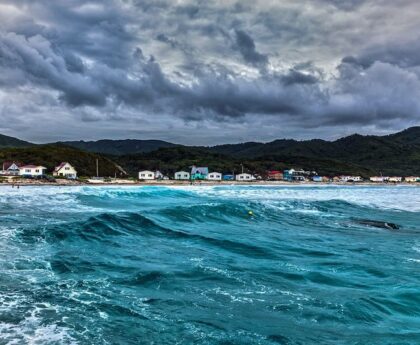Argentina Election: Vote Count Starts as Chance of Run-off Rises
Tensions Rise in Argentina‘s National Election
On October 22, Argentines came out in full force to cast their ballots in a tense national election characterized by the country’s worst economic crisis in two decades and growing dissatisfaction with the traditional elite. The election has garnered attention due to the prominence of a far-right libertarian radical, Javier Milei, who has emerged as the frontrunner. However, with three main candidates vying for votes, a run-off vote is expected.
The Candidates and the Race for the Presidency
The three main candidates who are likely to split the vote are Javier Milei, a libertarian economist; Sergio Massa, a centrist Peronist Economy Minister; and Patricia Bullrich, a conservative. Javier Milei gained attention and support after a surprise win in the August primary. Milei’s radical and unconventional approach has resonated with voters who are frustrated with the country’s high inflation rate and widespread poverty. His promises to overhaul the economic and political status quo have drawn comparisons to Donald Trump and Jair Bolsonaro.
Sergio Massa, the current economy chief, has faced criticism for overseeing triple-digit inflation. However, he has pledged to cut the fiscal deficit and defend the Peronist social welfare safety net. Massa is running on the platform that Peronism is the only ideology that can ensure basic necessities for all members of society.
Patricia Bullrich, a former security minister who is popular among business circles, has seen her support weaken with the emergence of Milei. Pollsters predict that she is the most likely candidate to miss out on a second round.
The Implications of the Election
With the three top candidates offering contrasting visions for the country’s future, the outcome of the election will have profound implications. Not only will it impact Argentina‘s financial markets, but it will also shape the nation’s political and social trajectory and influence its relationships with key trade partners, such as China and Brazil.
Argentina, known for its significant agricultural exports and abundant natural resources, including lithium and shale gas reserves, plays a crucial role in the global economy. Any major shifts in policy and governance could have far-reaching consequences, both domestically and internationally.
Philosophical Discussion: Polarization and Upheaval
The intense polarization witnessed in Argentina‘s current election reflects a broader global trend. As stated by 72-year-old pensioner Silvia Monto, “We have never had so much polarization.” The rise of Milei and his radical messaging echoes the global phenomenon of far-right movements gaining traction in various countries. The discontent felt by the electorate can be attributed to high inflation, economic instability, conflicts, and migration.
But what does this polarization and upheaval say about our society at large? Does it signal a breakdown of traditional political systems? Or is it a reflection of deep-rooted frustrations and an urgent need for change? Whatever the interpretation, it is crucial to understand the underlying causes and address the concerns that are driving people towards extreme ideologies.
Editorial: The Need for Pragmatism and Sustainable Solutions
Argentina is grappling with a dire economic crisis, with empty central bank reserves, an imminent recession due to a major drought, and an uncertain $44 billion program with the International Monetary Fund (IMF). It is clear that the incoming president will have an immense responsibility to stabilize the economy, address widespread poverty, and restore confidence in Argentina‘s financial institutions.
While uncompromising ideologies may capture the attention, it is essential for the candidates and their supporters to prioritize pragmatism and seek sustainable solutions. Building a prosperous nation requires not only bold ideas but also a careful consideration of the social and economic implications of policy decisions.
The future president must strike a delicate balance between addressing the immediate needs of the population and implementing long-term strategies for sustainable growth. Rebuilding trust and fostering cooperation among different factions and interest groups will be essential to navigate the complex challenges ahead.
Advice: The Role of Citizens
As voters, it is our responsibility to carefully consider the candidates and their proposed policies. We must critically analyze their platforms, track records, and ability to deliver on their promises. It is not enough to be swayed by flashy rhetoric or extreme ideologies.
We must demand clear and practical solutions that prioritize the well-being of all citizens. Rather than being driven purely by emotions or short-term gains, we should seek candidates who demonstrate a thoughtful understanding of Argentina‘s complex challenges and present comprehensive plans to address them.
Furthermore, citizens must actively engage in the democratic process beyond the election. Holding elected officials accountable and participating in civic activities, such as grassroots movements and advocacy organizations, can help shape the country’s future direction and ensure that the voices of the people are heard.
Ultimately, the outcome of Argentina‘s election will have far-reaching consequences for the nation and its role in the global community. It is essential for all stakeholders, from political leaders to citizens, to come together and work towards a future that embraces pragmatism, sustainability, and inclusive governance.

<< photo by Irina Rudnik >>
The image is for illustrative purposes only and does not depict the actual situation.
You might want to read !
- Counting Underway: Argentina’s Future Hangs in the Balance
- “Rebecca Loos Claims David Beckham Creates False Image of Himself …”
- Rebecca Loos Criticizes David Beckham’s Victim Mentality in Affair Scandal
- South Africa’s Preparations for Rugby World Cup Final Are Incomplete
- All Blacks vs Springboks: A Clash of Titans in the Rugby World Cup Semi-Final
- No Hard Feelings: Jennifer Lawrence Brings the Laughs in New Streaming Comedy
- The True Reason Behind Bijan Robinson’s Limited Playing Time in the Atlanta Falcons
- Saskatchewan Roughriders’ playoff hopes dashed by Toronto Argonauts
- Emily Blunt issues apology for making offensive comment about restaurant worker’s size
- Exploring the Top Hospitality and Leisure Stocks on the TSX: A Must-Buy for Today’s Investors
- Société du Parc Jean-Drapeau’s Involvement Unveiled: A Closer Look at its Association with the Fédération …




